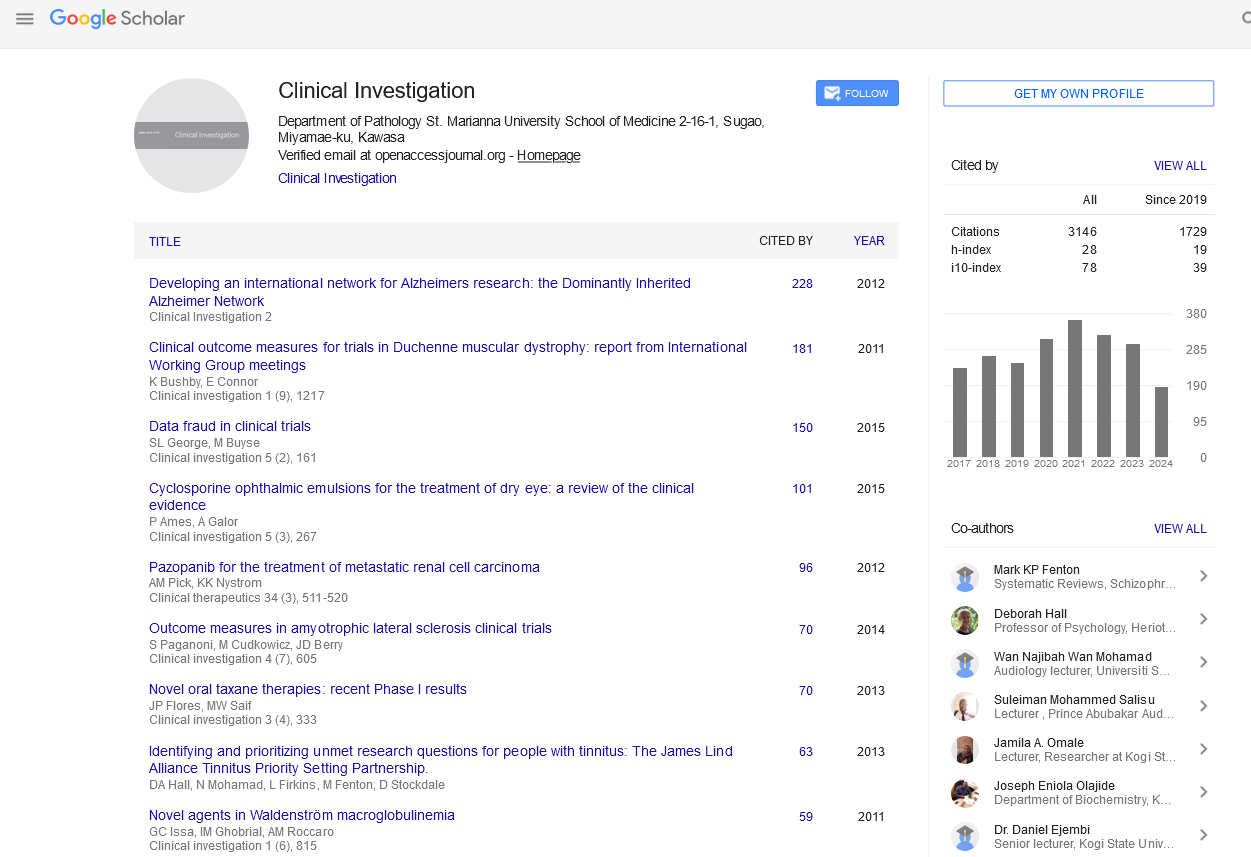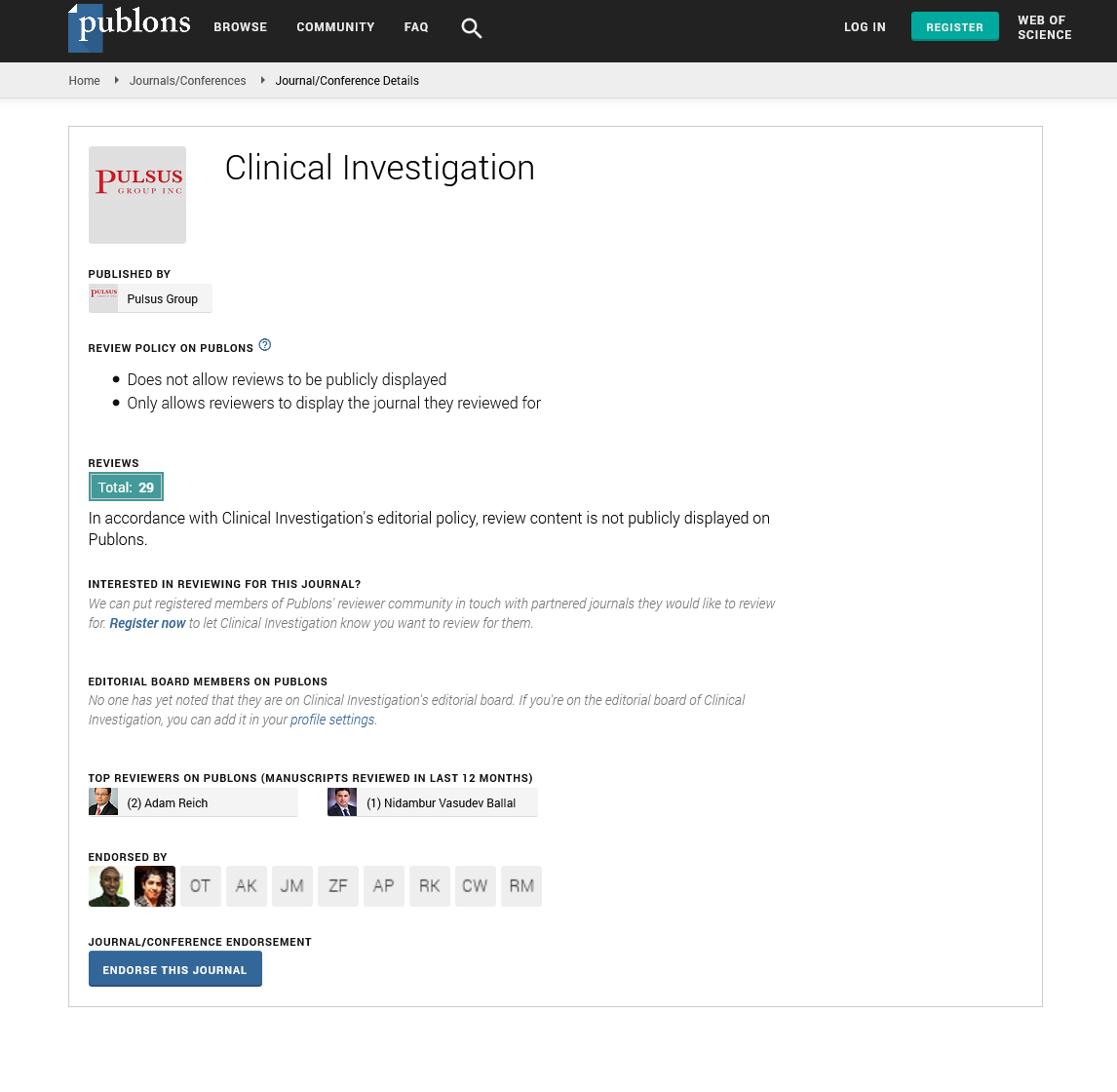Opinion Article - Clinical Investigation (2024) Volume 14, Issue 3
The Role of Clinical Trials in Advancing Medical Science and Improving Patient Care
- Corresponding Author:
- Reema Yei
Fudan University, Faculty of Biology, China
E-mail: reemayei@gmail.com
Received: 3-Mar-2024, Manuscript No. fmci-25-160263; Editor assigned: 6-Mar-2024, PreQC No. fmci-25-160263(PQ); Reviewed: 15-Mar-2024, QC No. fmci-25-160263(Q); Revised: 20-Mar-2024, Manuscript No. fmci-25-160263(R); Published: 27-Mar-2024
Abstract
Clinical trials are essential to the development of new medical treatments, therapies, and interventions. These controlled studies evaluate the safety and efficacy of new drugs, medical devices, and other health interventions before they can be approved for widespread use. This article explores the importance of clinical trials in medical research, focusing on their types, phases, ethical considerations, and the challenges involved. It also discusses the impact of clinical trials on improving patient care, ensuring regulatory standards, and shaping the future of healthcare. The article concludes by highlighting the need for increased patient participation, greater transparency, and innovative strategies to enhance the efficiency of clinical trials.
Keywords
Clinical trials • Drug development • Patient care • Adaptive trials • Ethical considerations • Medical research • Phases of clinical trials • Regulatory standards
Introduction
Clinical trials are the cornerstone of medical research, acting as a bridge between laboratory discoveries and clinical practice. These trials are designed to test the safety, efficacy, and optimal use of new medical interventions, such as drugs, vaccines, surgical procedures, and medical devices. They provide vital evidence to guide clinical decision-making and ensure that new treatments are both effective and safe for patients.
Historically, clinical trials have been instrumental in advancing healthcare. The development of life-saving treatments like antibiotics, cancer therapies, and vaccines has all been made possible through rigorous clinical testing. With the rapid pace of medical innovation, clinical trials are more important than ever in evaluating new interventions and addressing pressing health challenges, such as emerging infectious diseases, chronic conditions, and cancer.
This article will examine the types of clinical trials, the different phases involved, the ethical principles that govern them, and the challenges that clinical trials face today. It will also explore how clinical trials contribute to improving patient care and shaping the future of healthcare.
Types of clinical trials
Clinical trials are broadly classified based on their design, objectives, and the nature of the intervention being tested. The main types of clinical trials include:
• Interventional trials: In interventional trials, participants are assigned to receive specific treatments, drugs, or procedures to assess their effects on health outcomes. These trials are designed to establish the cause-and-effect relationship between an intervention and a health outcome. Examples include testing new medications, surgical techniques, or the effectiveness of a new vaccine.
• Observational trials: Unlike interventional trials, observational trials involve no active intervention. Researchers observe participants and collect data on various health-related factors, such as lifestyle habits, genetic factors, or environmental influences. Observational studies are often used to identify risk factors for diseases or understand the progression of a particular condition. They are crucial for public health research and epidemiology.
• Prevention trials: Prevention trials aim to determine whether a specific intervention can prevent the occurrence of a disease or condition. These trials may test vaccines, lifestyle changes, or medications to see if they reduce the risk of developing certain health problems.
• Diagnostic trials: Diagnostic trials are conducted to identify better methods for diagnosing a particular disease or condition. These trials evaluate new diagnostic tools or tests to determine if they can provide more accurate, faster, or less invasive diagnoses compared to existing methods.
Phases of clinical trials
Clinical trials are typically conducted in a series of phases, each designed to answer specific questions about a new treatment or intervention
• Phase I: Safety and Dosage: Phase I trials are the first step in testing a new treatment in humans. They usually involve a small group of healthy volunteers and are primarily concerned with evaluating the safety of the drug or intervention, determining its safe dosage range, and identifying side effects. These trials help researchers understand how the drug is metabolized and excreted by the body.
• Phase II: Efficacy and Side Effects: Phase II trials involve a larger group of participants (often those with the condition the treatment is intended to address) and aim to assess the treatment's efficacy in treating the disease or condition. Researchers also continue to monitor for adverse effects. Phase II trials help determine the optimal dose and provide preliminary evidence about the effectiveness of the intervention.
• Phase III: Confirmation of Efficacy and Monitoring Side Effects: Phase III trials are large-scale studies conducted to confirm the effectiveness of the intervention and monitor its side effects over a longer period. These trials often involve hundreds or even thousands of participants and are essential for obtaining the data required for regulatory approval. If a drug or treatment demonstrates positive results in Phase III trials, it can be submitted for approval to regulatory agencies like the U.S. Food and Drug Administration (FDA) or the European Medicines Agency (EMA).
• Phase IV: Post-Marketing Surveillance: After a treatment is approved and marketed, Phase IV trials are conducted to gather additional information about its long-term safety, effectiveness, and potential side effects. These trials are essential for identifying rare adverse effects that may not have been apparent in earlier phases and for assessing the drug's performance in the general population.
Ethical considerations in clinical trials
Ethical principles are central to the design and conduct of clinical trials to ensure that participants are treated with respect and that their rights are protected. Some key ethical considerations includes:
• Informed consent: One of the most important ethical requirements in clinical trials is obtaining informed consent from participants. Informed consent ensures that participants fully understand the purpose, risks, potential benefits, and procedures involved in the trial before agreeing to participate. Participants must also have the right to withdraw from the study at any time without facing negative consequences.
• Patient safety: Protecting the safety and well-being of participants is a top priority in clinical trials. Researchers must adhere to strict protocols to minimize risks and ensure that any potential harm is carefully monitored. In many cases, independent ethics committees or Institutional Review Boards (IRBs) review the study protocol to ensure it meets ethical standards.
• Randomization and blinding: Randomization and blinding are critical components in reducing bias and ensuring the validity of clinical trial results. Randomization ensures that participants are assigned to treatment or control groups randomly, while blinding prevents both participants and researchers from knowing which group they belong to, minimizing bias in the results.
Challenges in clinical trials
Despite their critical role in advancing medical science, clinical trials face numerous challenges
• Recruitment and retention: Recruiting and retaining participants for clinical trials can be challenging. Patients may be reluctant to join due to concerns about side effects, lack of understanding, or the perception of being a "guinea pig." Additionally, some populations, such as minorities or those with rare diseases, may be underrepresented in clinical trials, limiting the generalizability of results.
• Cost and duration: Clinical trials can be expensive and time-consuming, with some studies taking years to complete. The costs associated with recruiting participants, conducting tests, and monitoring longterm effects can be prohibitive, particularly for smaller research institutions or companies.
• Regulatory hurdles: Clinical trials must adhere to stringent regulatory requirements to ensure patient safety and data integrity. Navigating the regulatory landscape can be complex, especially when trials involve multiple countries with varying standards.
• Access to data: Data transparency is a growing concern in the clinical trial industry. While clinical trial results are crucial for scientific progress, there is often limited access to raw data, especially when results are negative or inconclusive. Greater transparency can improve trust and facilitate more robust meta-analyses.
Conclusion
Clinical trials are indispensable to the advancement of medical science, providing the evidence necessary to bring new therapies to the market and improve patient care. Despite challenges such as recruitment, cost, and regulatory hurdles, the continuous evolution of clinical trial design, technology, and patient engagement strategies holds great promise for overcoming these barriers. By addressing ethical considerations and ensuring greater transparency, clinical trials can continue to play a crucial role in developing safe, effective treatments that improve public health globally.
As the healthcare landscape continues to evolve, the future of clinical trials lies in more personalized, adaptive designs, greater patient participation, and the integration of new technologies like artificial intelligence and real-time data monitoring. These innovations will help accelerate the pace of discovery and bring cutting-edge treatments to patients faster, ultimately improving health outcomes and quality of life.


